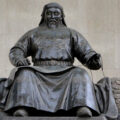Imperial Romance and American Dreams

America is obsessed with adventure narratives. From the Indiana Jones franchise and Westerns such as Netflix’s “Godless,” to the AI updates in HBO’s “Westworld” and the spy games of James Bond, it seems we can’t get enough.
Christopher Benfey’s recent biography of the British ur-adventure-writer Rudyard Kipling, If: The Untold Story of Kipling’s American Years, sheds some light on the American obsession. Kipling, once compared to Shakespeare and the “most popular and financially successful writer in the world,” but now known by many as “‘the most politically incorrect writer in the canon,’” was one of the godfathers of adventure fiction, often called imperial romance. He wrote his imperial romances at a time when Europe was on the wane and American empire was on the rise. Kipling’s time living in the United States, from roughly 1889 to 1899, was integral to his “aesthetic development,” Benfey argues, and it was during this decade that he wrote his best-remembered adventure fictions, The Jungle Book and Kim, among other things.
According to Benfey, “Kipling became the writer we know in large part because of his deep involvement with the United States.” No wonder that the genre he pioneered would continue to strike a chord with Americans more than a century later. Kipling was not only “the most influential writer of his time in the United States,” but his writing and ideas “have affected public policy and popular culture in ways that we do not yet fully understand.”
Given Kipling’s reputation as the “jingoist Bard of Empire, a man on the wrong side of history,” it’s tempting to ask why we should care. Why do American critics and academics, as well as the American public, return to imperial romance writers like Kipling, or his contemporary, Joseph Conrad? What can we possibly gain by giving our attention to what many readers today consider their racist tomes?
The imperial romances of the late-nineteenth- and early-twentieth centuries assuaged Anglophone fears about the modern world’s lack of adventure. The frontiers depicted in these fictions, ranging from the India of Kipling’s Kim to the central parts of Africa in texts such as H. Rider Haggard’s King Solomon’s Mines and Joseph Conrad’s Heart of Darkness, were lawless zones where a white man could become a hero by any means necessary, doing whatever he had to do to obtain absolute power. Kipling studied Bret Harte’s “pioneering western tales” as a “model for his own stories,” grappling in The Jungle Book with the violence he saw as the “molten core” of American life. Benfey highlights Kipling’s investment in individual responsibility. “In tale after tale,” Benfey reminds us, “Kipling places the main character in difficult circumstances where a choice must be made despite imperfect options. A recurring question is ‘What else could I have done?’”
So important is Kipling’s insistence on personal accountability in Benfey’s rendition that he gives the biography the title of Kipling’s poem, “If –”, describing the poem as “a plea for the self-reliant man who accepts responsibility for his actions.” And indeed, the poem urges the young Everyman it addresses to recognize that “If you can keep your head” and “hold on when there is nothing in you / Except the Will which says … ‘Hold on,’” then “Yours is the Earth and everything that’s in it, / And—which is more—you’ll be a Man, my son!” Benfey’s Kipling represents, reinforces, and yes, romanticizes, the professed core values of American capitalism: individual dedication to hard work and to doing whatever needs to be done to succeed.
Kipling’s self-reliant white man resides in the violent American wet dream of Manifest Destiny. He (always he) is the hero who uses nothing but his bare hands to remake the frontier space of imperial adventure into the productive settler capitalist space of every American fantasy. In fact, Benfey unconsciously implies that perhaps the American mascot should be the hard-working beaver, not the bald eagle. Kipling, Benfey tells us, spent as much time as he could with America’s beavers, first in the wild near his home in Vermont, and then at the zoo in Washington D. C., where he often strolled with Theodore Roosevelt. Beavers became a “major preoccupation” for Kipling because they “worked tirelessly”; what “Kipling admired in his beloved beavers was a colonial world in miniature.” Beavers settle territory, changing landscapes and ecosystems to establish their colonies, though technically they use bared teeth instead of bare hands. They make “new worlds” out of indigenous landscapes through the very thing—allegedly, the only thing—one needs to get ahead in America: hard labor. To be labeled an “eager beaver” or a “busy beaver” is the mark of a good capitalist subject in the American workplace.
Despite this focus on Kipling’s love of individual responsibility (and his admittedly endearing love of beavers), Benfey does not shy away from Kipling’s often—though not always—problematic stances on empire, either British or American.
Acknowledging that Kipling’s infamous poem “The White Man’s Burden” is “unashamedly racist,” Benfey details Kipling’s concurrent influence in the US decision to “enter the Great Game of empire building” in the Pacific, as well as the actual (capitalist) reasons for doing so. In seizing “the previously independent country of Hawaii” as well as the Philippines, the subject of Kipling’s poem, the US acquired “a new market for American goods,” as well as providing “American warships” with “a perfect base for patrolling the Pacific.” For Kipling, however, Benfey writes, “the imperialist impulse is strictly humanitarian”; hence the racist “The White Man’s Burden” rather than a more accurate poem and title, such as “The White Man’s Global Market Grab.” Benfey’s analysis of the poem itself could be more stringent. He speculates that “the challenge Kipling envisions for the technologically advanced nations—of introducing modern medicine, sanitation, and transportation to those less fortunate,” represent “some of the better intentions of American foreign policy,” and “if you changed a few words and renamed the poem ‘The Burden of the Developed World,’” it wouldn’t be far off from describing those intentions.
What Benfey fails to address is the problem that underlies both this alternate title and the “better intentions” it describes. Racism under the name of white saviorism is still racism.
Benfey insists that it is not his intent to “rehabilitate” Kipling, and the book bears this out, however gently it treads. Kim is an “uncomfortable” reminder that “blindness and insight are often oddly combined in our major writers.” Despite Benfey’s own blind spots, such as his reading of “The White Man’s Burden,” he largely considers the complexity of Kipling’s work and ideas during the years of his American residency with critical nuance rather than an agenda that is either wholly recuperative or wholly damning. While such analytical objectivity is refreshing in our current moment of knee-jerk fundamentalisms, it is perhaps not enough to justify our cultural attention to yet another biography of Kipling. Fortunately, Benfey does more.
Benfey illuminates Kipling’s “new relevance” to the United States, tracing his influence on the Vietnam War and into our own contemporary moment of endless global war. Kim, Kipling’s imperial romance about the “Great Game” of spy craft between Russia and Britain as played out in India and what is now Pakistan between the Second and Third Afghan Wars of the 1880s, “served as a semiofficial code of conduct” for CIA operatives who “were instructed to read the novel” in the 1950s. “It is not an exaggeration,” Benfey declares, “that from 1954 on, the Vietnam War was fought—at least from the covert American standpoint—according to Kipling’s rules.” And that was not the only Kipling influence at play. Benfey suggests that a “little known Kipling poem—initially quoted as ‘you cannot hurry the East’—wormed its way into the very highest levels” of American “decision-making” during the Vietnam War.
The kicker, for Benfey, is that the poem, which was “invoked repeatedly,” was misquoted the entire time; “Kipling had warned instead against any attempt to hustle the East.” The poem actually reads
And the end of the fight is a tombstone white with the name
of the late diseased,
And the epitaph drear: “A Fool likes here who tried to hustle
the East.”
Benfey thus labels it “the antidote” to “The White Man’s Burden,” a poem that “warns against any attempt to meddle in the affairs of a distant country,” and he further argues that its interpretation “resembles, in key ways, the proper historical interpretation of the war in Vietnam (and of subsequent wars in Afghanistan, Iraq, and Syria that have come to resemble it in unsettling ways).”
In a similar vein, Benfey explores Kipling’s 1888 short story, “The Man Who Would be King,” a tale of two white adventurers who dream of a kingdom of their own, and set off for Afghanistan to get it. At the end of this quest, only one adventurer returns: he is a wreck of a man who has barely escaped his own crucifixion at the hands of his Afghan “subjects,” and he carries the severed head of his partner with him in a bag. Here, as Benfey argues, Kipling gives us the well-deserved consequences reaped by “two fools who tried to hustle the East.” The imperial romance of the self-reliant white man turns into an unsparing nightmare, as so often does our own American Dream, whether in Vietnam or Afghanistan.
Some reviewers have found fault with Benfey’s somewhat “disjointed narrative” for providing “little sense of Kipling’s actual presence.” But to my mind, this is part of the book’s strength. Benfey has given us a biography which is neither full-blown Kipling worship nor a full-on decolonizing takedown, but which instead models a more useful—even a necessary—way to think about writers of empire. How and why do they remain relevant to our contemporary moment, in both their troubling racism and the simultaneous complexity of their views and work?
We cannot abide rehabilitation, but neither can we afford the total erasure of this influential literary and cultural history, a body of work that finds its morals and models repeated at the highest levels of government. As Benfey asks, “Does the United States in Vietnam (or Iraq or Afghanistan) simply repeat the British mistake in India, or South Africa?” Is “the unlearned lesson the same old banal one—that history repeats itself? Or is there some specific illness—call it imperialism—that Kipling had his finger on?” If a thoughtful return to imperial romance writers, like Benfey’s new assessment of Kipling, can help wake us up from our false settler capitalist fantasy, it is worth that return.
About Katherine Anderson
Katherine Anderson is a professor of Victorian literature and culture at Western Washington University. She is a contributor to Public Books and is finishing a book on torture and liberalism in the British Empire.





